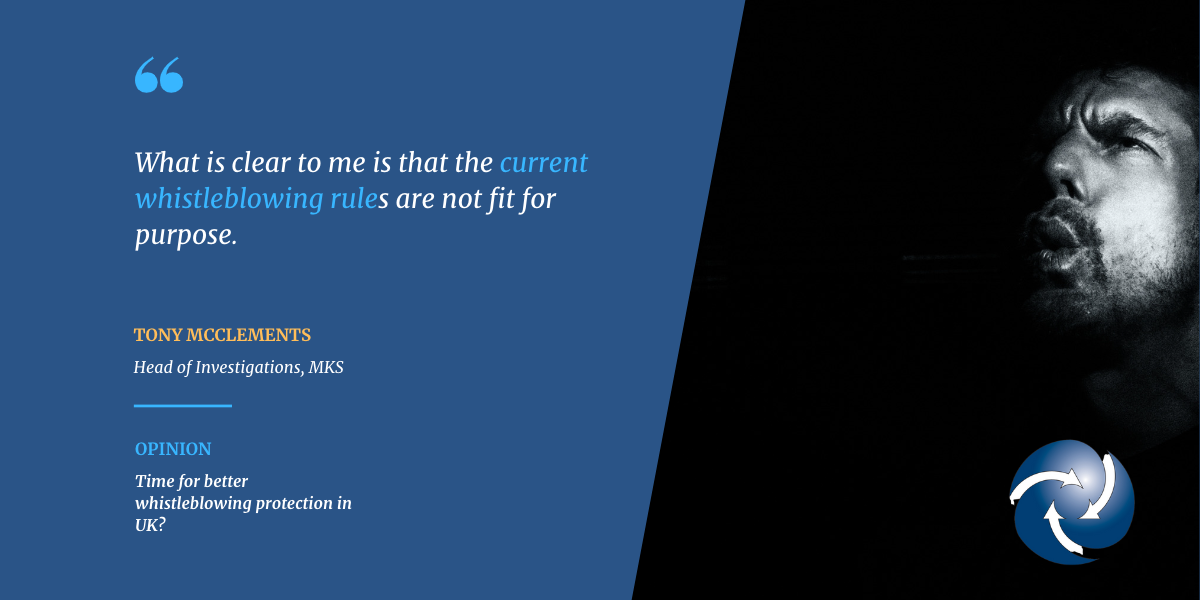By Tony McClements, Head of Investigations
Those of us who investigate fraud and corruption see enormous advantages in the UK operating dynamic and meaningful whistleblower legislation.
This legislation is designed to protect those who alert the authorities and regulators to behaviour and actions that fall short of what should be expected.
However, I consider that the existing Public Interest Disclosure Act 1998 legislation falls short of what we should aspire to.
After the U.K. Supreme Court recently denied permission for an appeal by a whistleblower fired from an international bank, there are suggestions that the case could add momentum to efforts to reform whistleblowing law.
I have little knowledge of the actual case, so will refrain from commenting further there, aside from that the fact that calls for a change in legislation chime very much with my own thinking.
It is only natural that those of us on the anti-corruption, counter-fraud and regulatory side of the fence perceive huge advantages in encouraging genuine whistleblowing reports. The emphasis here is on the word “genuine”.
it is obvious that “insider information” will be invaluable to the authorities
It is understandable, of course, that if you operate a company, or are charged with ensuring an organisation meets its regulatory obligations, you may be wary of the whistleblower. Vexatious and malicious reports from those with an axe to grind are always a potential threat.
Unfortunately, in the world today crooks not only lie, but unscrupulous directors can pay bungs and might be prepared to push the regulatory envelope in the quest for profit. If we add to this mix the potential for identifying cash flows tinged with terrorist and criminal financing, it is obvious that “insider information” will be invaluable to the authorities.
Too often, law enforcement finds itself on the outside looking in when dealing with organised crime. One of the ways it can influence this dynamic is by “recruiting” someone on the inside of an organised crime group (OCG) and use this covert human intelligence source (CHIS) to gain insight into the OCG and how best to attack it.
In other scenarios, complex frauds may take years to piece together without the inside knowledge of one of the offenders. Without the assistance of Frank DiPascali during the Bernie Madoff trial, it would have taken prosecutors a lot longer to understand the extent of Madoff’s fraud – despite the fraudster’s confession.
There is legislation governing the use of a CHIS and established protocols designed to protect not only their interests, but also the legal interests of the suspects. Should law enforcement step outside of these rules, then a case can quickly unravel.
A CHIS might be motivated by financial reward, revenge, or simply trying to put the opposition out of business. None of these motivators say much about the integrity of the source, but does it devalue their evidence/intelligence?
there are informants who come forward for noble reasons
It certainly enables the defence to make a case that the evidence/intelligence should be considered dubious because the source was self-serving. The jury makes up its own mind based on the respective prosecution/defence presentations.
However, there are informants who come forward for noble reasons. It may be a friend or relative of the suspect who wishes to protect them, or who they perceive to have overstepped the mark. There have been recent murders where innocent members of the public have lost their lives having been caught in the crossfire between rival gangs.
As someone who used to form part of the teams that investigate murder, you will be surprised by the information that creeps out from within the criminal fraternity when a “civilian” becomes an innocent victim. They may be criminals, but some do have a questionable code of ethics that they try to live by.
This may be a controversial point of view, but I see very little difference between a CHIS and a whistleblower. Both provide invaluable insight into wrongdoing; both are often first-hand witnesses to the events that prompt them to come forward. Likewise, their motivation can also vary widely.
This may be a controversial point of view, but I see very little difference between a CHIS and a whistleblower
Unlike the USA, whistleblowers in the UK enjoy comparatively minimal protection from reprisal. It is also relevant that there is an inherent risk to being a whistleblower. If you work in a niche or close-knit industry, there is the danger you maynot be able to find work again.
That is one reason that current whistleblower protections need to be enhanced. This can only be achieved is by drafting legislation fit for purpose and establishing protocols that support both the whistleblower, those they report to within the organisation and those on whom they are reporting.
Note that I do not advocate simply protecting the source, but also the organisation: in a similar fashion to how the criminal law operates. I am not a lawyer, but a retired cop, so I am unclear as to how best we can achieve this objective, but the lawyers among you may have some idea as to how we can begin the discussion.
What is clear to me is that the current whistleblowing rules are not fit for purpose. I anticipate pushback from those who may be subject of these reports, concerned that if we offer additional whistleblower protections, then this may encourage spurious complaints.
However, can anybody make the case that whistleblowers are not one of our ultimate lines of defence where corruption is concerned. And that if they are moved to make a report in good faith, then they should be protected from reprisal?
 Tony McClements is Head of Investigations at MKS and a 33-year veteran police detective investigating serious & organised crime, specialising in the investigation of fraud since 1998.
Tony McClements is Head of Investigations at MKS and a 33-year veteran police detective investigating serious & organised crime, specialising in the investigation of fraud since 1998.

